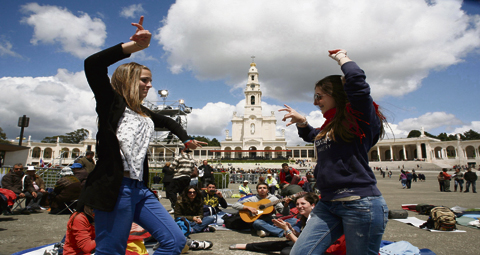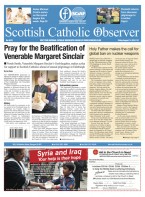February 10 | ![]() 0 COMMENTS
0 COMMENTS ![]() print
print

The struggle to become lords of the dance
— Fr Ronald Rolheiser
Henri Nouwen used to publish some of his diaries under the title, On Mourning and Dancing. The title was wholly appropriate since those diaries chronicled much of his own struggle to give public expression to what was bubbling up inside of him and, at the same time, respect a highly sensitive self-consciousness and reticence that made him hesitate to publicly express those same feelings. And so his writings are a rare expression of both inner freedom and inner fear.
His thoughts and feelings are sometimes tortured, but that’s what makes them rich. It is not always easy to find that delicate balance between healthy self-expression and unhealthy exhibitionism, even if you are Henri Nouwen—or perhaps especially if you are Henri Nouwen.
The struggle to find a way to express oneself freely and deeply and yet not cross the line into unhealthy exhibitionism is a tough task for everyone. You see it done well in rare cases—Jesus and a number of great people like Mother Theresa. They can be great without being grandiose and can give public expression to what is most intimate within them without making you cringe or feel uncomfortable or embarrassed for them. But that is a rare talent; check out any dance floor.
How someone dances is often an indication of the kind of balance he or she has been able to achieve on this. Sometimes you see a healthy dancer who exhibits no inhibiting self-consciousness and, at the same time, no excessive self-focus or self-abandonment.
A healthy dancer’s movements have an easy, natural flow that draws your eyes and attention to the dance and not to the dancer. Moreover, even in the dance, a healthy dancer is still recognisably the person you know and not some impersonal, anonymous energy that is acting out in a dance. But it is hard to dance well.
More often than not someone’s dance step is coloured by his or her inner struggle and by where his or her internal compass has been set: Too self-aware, too cautious, too fearful, and we see a dance-step that is reticent, halting, and apologetic. Conversely, too little self-awareness and we see a dance-step that is free and uninhibited but which manifests an unhealthy exhibitionism. Sometimes our dance step reveals too little, just as sometimes our dance step reveals too much and we cross a line where self-expression becomes acting out and people see an unhealthy narcissism and self-abandonment in our dance step and are embarrassed for us.
Our struggle to dance well, mirrors another tension inside us, namely, the struggle between depression and inflation, between feeling too-high or feeling too-low. Just as a healthy dance step is not easy to achieve so too is a healthy psyche, one within which our energies flow freely but without unhealthy narcissism or exhibitionism. The problem is that we are forever being pulled up or down, over-stimulated in our grandiosity or undervalued in being. Both can leave us less than steady.
Only the most mature and secure of us are not unduly swayed in our moods and our actions by the affirmations and rejections we meet in our daily lives. Inside of our families, our friendships, our places of work, our churches, and even inside of many of our simple impersonal interactions with others in public life, we are constantly meeting either affirmation or rejection of some kind—a smile, a thank you, a compliment, a warm pat on the back, a recognition of a job well done, some other gesture of love, or, conversely, a coldness, a put-down, an insult, a criticism, a slight, a snub.
Whenever this happens we are powerless to protect ourselves against how this infects our psyche and our emotions. Lots of affirmation and we can easily find ourselves too full of ourselves and too empty of God and others. Too much coldness and rejection and we can easily find ourselves too empty of ourselves and of God’s wonderful energy inside us.
I say this with empathy. Life is hard for everyone, particularly if you are trying to live in a way that respects others even as you try to honour your own energies. If you are healthily sensitive it will always be a struggle: How do you properly honour, act out, and celebrate your own more-exuberant energies in ways that fully respect others and don’t cross any moral or aesthetic lines? Not an easy formula. Too little allowance for exuberance and you will find yourself overly-reticent, tongue-tied, frustrated, sterile, and dealing with a lot of anger; too much unchecked exuberance and you will act out in ways that embarrass you and embarrass others.
And so we should accept this struggle as a given and not be too hard on others and ourselves. We are human and so we need to forgive each other and ourselves for being uptight and halting in our dance steps, even as we forgive others and ourselves for the acting-out we have done on those same dance-floors. There are very few free, fully healthy, persons in this world. Nobody dances perfectly.
n Fr Ronald Rolheiser, is a member of the Missionary Oblates of Mary Immaculate and is president of the Oblate School of Theology in San Antonio, Texas











